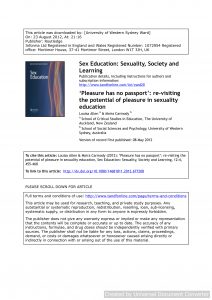Sexuality Education & Therapy with Children
Pleasure has no passport: Re-Visiting the Potential of Pleasure in Sexuality Education
 Full Article Name: ‘Pleasure has no passport’: Re-Visiting the Potential of Pleasure in Sexuality Education
Full Article Name: ‘Pleasure has no passport’: Re-Visiting the Potential of Pleasure in Sexuality Education
Open Access: No
Abstract
The idea that pleasure might form a part of sexuality education is no longer a ‘new’ idea in the field of sexuality studies. In this paper we examine how originally conceived notions of pleasure have been ‘put to work’ and theoretically ‘taken up’ in relation to sexuality and education. It is our contention that because of the nature of discourse and varying cultural and political contexts, pleasure has been operationalised in ways we did not intend or foresee. Throughout this discussion we seek to discern the discursive limits of visions of pleasure to illuminate their normalising potential. Drawing on Foucault’s thoughts about pleasure as having ‘no passport’ and queer theoretical understandings of this concept, we argue for a re-conceptualisation of the potential of pleasure in sexuality education. In particular we identify the need for wedging open spaces for the possibility of ethical pleasures, in forms that are not heteronormatively pre-conceived or mandatory.
Citation
Allen, L., & Carmody, M. (2012). ‘Pleasure has no passport’: Re-visiting the potential of pleasure in sexuality education. Sex Education: Sexuality, Society and Learning, 12(4), 455-468. http://dx.doi.org/10.1080/14681811.2012.677208
